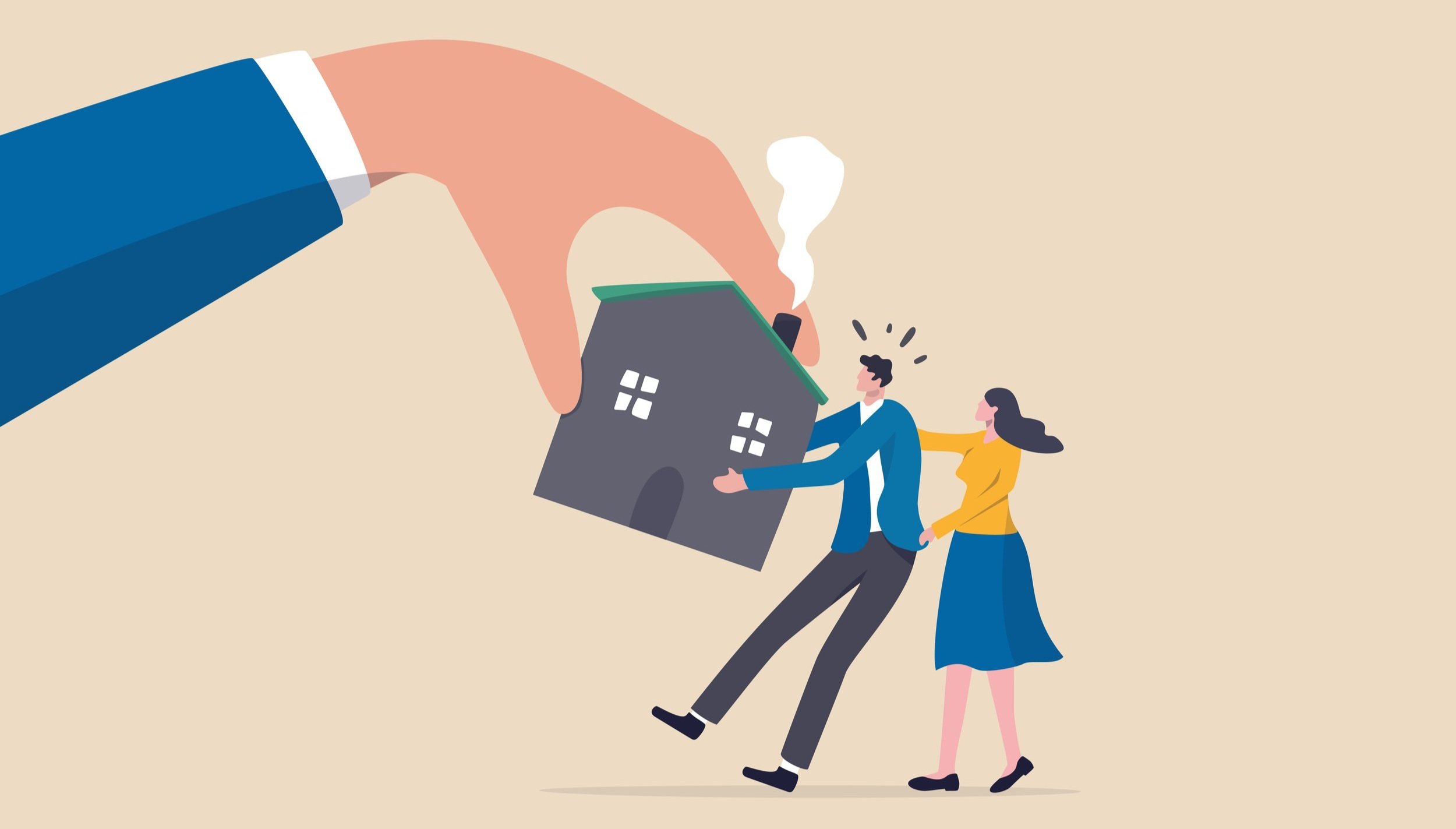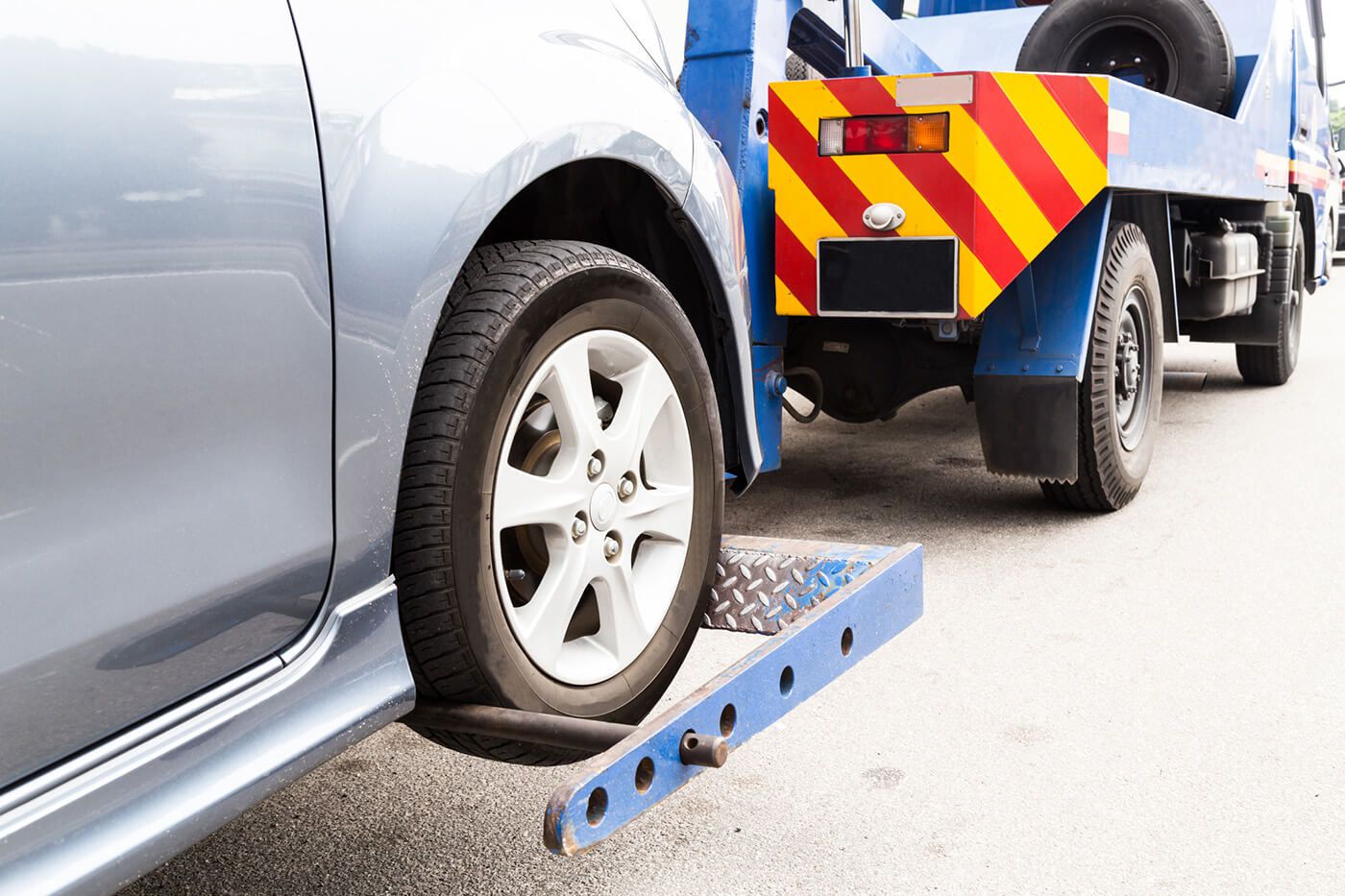

Finance
How Bad Is Repossession On Your Credit
Published: January 8, 2024
Learn how repossession can impact your credit score and overall financial health. Find out what steps you can take to mitigate the damage and improve your finances.
(Many of the links in this article redirect to a specific reviewed product. Your purchase of these products through affiliate links helps to generate commission for LiveWell, at no extra cost. Learn more)
Table of Contents
Introduction
When it comes to your financial well-being, a good credit score is crucial. It can impact your ability to secure loans, get favorable interest rates, and even rent an apartment. However, life doesn’t always go according to plan, and unforeseen circumstances may lead to a repossession. But how bad is repossession on your credit?
Repossession occurs when a lender takes back an asset, such as a car or home, due to non-payment. It is a significant event that can have lasting consequences on your creditworthiness. Understanding the impact of repossession on your credit is essential for making informed decisions and taking proactive steps to mitigate the damage.
In this article, we’ll explore the consequences of repossession on your credit score. We’ll also discuss how long the negative effects may last and provide strategies for rebuilding your credit after a repo. Additionally, we’ll offer tips on how to avoid repossession altogether.
Whether you’re currently facing the possibility of repossession or simply want to be prepared for the future, this article will equip you with the knowledge to navigate the financial impacts and work towards a brighter credit future.
What is Repossession?
Repossession is a legal process in which a lender reclaims an asset that was used as collateral for a loan or lease agreement. This typically occurs when the borrower fails to make timely payments, violating the terms of the loan agreement.
In the context of personal finance, the most common type of repossession is related to vehicle loans. If you financed a car and continuously miss payments, the lender may initiate the repossession process to take back the vehicle. However, repossession can also occur for other assets, such as homes, boats, or even electronic equipment, depending on the terms of the loan or lease agreement.
Repossession can be a distressing experience, as your asset is seized and taken away. Once repossessed, the lender will typically sell the asset to recoup the remaining balance of the loan. If the sale of the asset doesn’t cover the full debt, the borrower may still be responsible for the remaining balance, known as a deficiency balance.
It’s important to note that repossession laws and regulations vary by jurisdiction, so it’s essential to consult with a legal professional familiar with your area’s specific rules and regulations.
Now that we have a better understanding of what repossession entails, let’s explore how it impacts your credit.
How Does Repossession Affect Your Credit?
Repossession can have a significant negative impact on your credit. It is considered a severe derogatory event and can lower your credit score significantly. Here are some key ways repossession affects your credit:
- Credit Score: Repossession can cause a significant drop in your credit score. The exact impact depends on various factors, such as your previous credit history and the overall state of your credit. Generally, the more positive your credit history, the more substantial the impact of repossession on your credit score.
- Credit History: Once a repossession is reported on your credit report, it stays there for several years, typically up to seven years. This negative item on your credit history can make it challenging to obtain new lines of credit or secure favorable terms on future loans.
- Creditworthiness: Repossession raises concerns about your creditworthiness in the eyes of lenders. They may view you as a higher risk borrower, which can result in difficulty securing new loans or obtaining credit at reasonable interest rates.
- Financial Opportunities: A repo on your credit report can also impact other financial opportunities, such as renting an apartment or getting approved for a mortgage. Landlords and lenders often review credit reports to assess a person’s financial responsibility, and a repossession can be a red flag.
It’s important to note that the specific impact of repossession on your credit can vary depending on other factors present in your credit report. For instance, if you have a solid history of making on-time payments and have other positive accounts, the impact might be less severe compared to someone with a history of late payments and other negative factors.
Understanding the consequences of repossession on your credit is crucial for taking steps to rebuild your credit and minimize the long-term impact. In the next section, we’ll explore the duration of these negative effects on your credit report.
Impact on Credit Score
A repossession can have a significant impact on your credit score. How much it affects your score depends on several factors, including your credit history prior to the repossession and the overall state of your credit.
Typically, the higher your credit score was before the repossession, the more significant the drop in your credit score will be. For instance, if you had an excellent credit score in the 800s, a repossession could result in a larger score decrease compared to someone with a lower credit score.
On average, a repossession can lead to a drop in your credit score by around 100 to 150 points. However, it’s important to note that this is just a rough estimate, and individual experiences may vary.
The impact of a repossession on your credit score is also influenced by other negative items on your credit report. If you have a history of missed payments, high credit card balances, or other derogatory marks, the repossession may have a less substantial impact. Conversely, if you had a clean credit history prior to the repossession, the drop in your credit score may be more severe.
It’s important to remember that a lower credit score can make it challenging to secure new credit or obtain favorable loan terms. Lenders may view you as a higher risk borrower and may be hesitant to approve your applications or will offer higher interest rates to compensate for the perceived risk.
While a repossession can cause a significant drop in your credit score, it’s not the end of the world. With time, proactive credit management, and responsible financial behavior, you can start rebuilding your credit. In the next section, we’ll discuss the duration of the negative effects of a repossession on your credit report.
Duration of Negative Effects
Repossession has a lasting impact on your credit report, and the negative effects can remain visible for a significant period of time. The duration of these effects depends on the specific credit reporting guidelines and the jurisdiction in which you reside.
Typically, a repossession can stay on your credit report for up to seven years from the date of the initial delinquency that led to the repossession. This means that the repossession will continue to appear on your credit report even if you eventually catch up on missed payments or settle the debt.
While the impact of a repossession lessens over time, it can still affect your ability to secure credit and favorable loan terms during this period. However, as time passes and you demonstrate responsible financial behavior, the negative impact of the repossession on your credit score should gradually decrease.
In addition to the repossession itself, any associated negative marks, such as late payments leading up to the repossession or a deficiency balance, can also stay on your credit report for up to seven years. This prolonged reporting period emphasizes the importance of taking steps to rebuild your credit and maintain positive financial habits moving forward.
It’s important to note that while a repossession may no longer be visible on your credit report after seven years, it doesn’t mean that its impact is completely erased. Lenders and financial institutions may still consider your past repossession when evaluating your creditworthiness, especially if it reflects a pattern of financial irresponsibility.
To mitigate the long-term negative effects of repossession on your credit, it’s crucial to take proactive steps to rebuild your credit. In the next section, we’ll explore strategies to help you regain financial stability and improve your credit score after a repossession.
Lender’s Reporting Process
When it comes to repossession, lenders have a specific reporting process that they follow to notify credit bureaus about the delinquency and subsequent repossession. Understanding this process can provide insights into how the repossession information is shared with potential lenders and creditors.
Typically, once a repossession occurs, the lender will report the event to the major credit bureaus. These credit bureaus, namely Experian, TransUnion, and Equifax, collect and maintain credit information on consumers. The lender will provide details about the repossession, including the date, type of account, and any associated deficiencies.
Once the credit bureaus receive this information, they update your credit report accordingly, marking the account as “repossessed” or “charge off.” This negative notation can significantly impact your credit score and remains on your credit report for up to seven years, as mentioned earlier.
It’s important to note that lenders are required to follow certain guidelines and regulations when reporting information to the credit bureaus. They must ensure the accuracy of the information they provide and promptly update the credit bureaus if there are any changes to the repossession status, such as settling the debt or removing the repossession due to a dispute.
You have the right to dispute any inaccuracies on your credit report, including errors related to the repossession. If you believe there is incorrect or outdated information on your credit report, you can submit a dispute to the credit bureaus, who will investigate the matter and make any necessary updates.
It’s worth noting that while the lender is responsible for reporting the repossession, they are not obligated to provide you with advance notice or seek your permission before initiating the repossession process. However, certain consumer protection laws may apply, so it’s important to be aware of your rights and consult legal advice if needed.
Understanding the lender’s reporting process can help you navigate the aftermath of a repossession, monitor your credit report for accuracy, and take appropriate steps to rebuild your credit. In the next section, we’ll discuss strategies for rebuilding your credit after a repossession.
Rebuilding Your Credit after Repossession
While repossession can have a significant impact on your credit, it’s not a permanent setback. With diligent effort and responsible financial behavior, you can begin rebuilding your credit and improving your creditworthiness. Here are some strategies to help you get started:
- Review Your Credit Report: Start by obtaining copies of your credit report from the three major credit bureaus. Carefully review the report and ensure that the repossession information is accurate. Dispute any errors or outdated information to have them corrected.
- Create a Budget: Establish a comprehensive budget that outlines your monthly income and expenses. By tracking your expenses and identifying areas where you can cut back, you can free up extra funds to pay off existing debts and avoid future financial difficulties.
- Pay Your Bills on Time: Consistently make timely payments on all your bills and debts. Payment history is a significant factor in determining your creditworthiness. Set up automatic payments or reminders to help you stay on track.
- Reduce Debt: Work towards paying off any outstanding debts, including the deficiency balance from the repossession. Consider prioritizing high-interest debts first and explore options such as debt consolidation or negotiation with creditors.
- Establish New Credit: Building new positive credit is essential to offset the negative impact of the repossession. Start by applying for a secured credit card or a credit builder loan. Make small purchases and pay them off in full each month to demonstrate responsible credit usage.
- Seek Credit Counseling: Consider working with a reputable credit counseling agency to develop a personalized financial plan. They can provide guidance on managing your debts, budgeting, and improving your credit score.
- Show Stability: Lenders look for stability when assessing creditworthiness. Maintain a stable job, residence, and financial situation to demonstrate your ability to meet your obligations.
Rebuilding your credit after repossession takes time, patience, and discipline. It requires consistent effort and a commitment to responsible financial behavior. As you implement these strategies, be persistent and stay focused on your long-term goals.
Remember, the negative impact of repossession on your credit will diminish over time as you develop a positive credit history. Continue practicing good financial habits, and over time, your credit score will gradually improve.
Avoiding Repossession
Repossession can be a distressing experience, but there are steps you can take to avoid it altogether. Here are some strategies to help you prevent repossession and maintain financial stability:
- Create a Realistic Budget: Develop a budget that accurately reflects your income and expenses. Prioritize your payments and ensure that you have enough funds to cover essential expenses, such as loan or lease payments.
- Communicate with Your Lender: If you find yourself struggling to make payments, don’t ignore the situation. Contact your lender as soon as possible and explain your financial difficulties. They may be willing to work with you on a modified payment plan or offer other options to help you avoid repossession.
- Explore Refinancing or Loan Modification: If you’re facing unmanageable payments, consider refinancing your loan or exploring loan modification options. These alternatives may help to lower your monthly payments, making them more affordable in the long run.
- Consider Selling the Asset: If you anticipate ongoing financial difficulties and are unable to keep up with payments, consider selling the asset before repossession becomes a reality. By selling the asset yourself, you have more control over the process and may be able to pay off the loan or lease fully.
- Seek Financial Assistance: In challenging financial situations, you may qualify for financial assistance programs or hardship programs offered by lenders. These programs can provide temporary relief and help you avoid repossession.
- Explore Debt Counseling: If you’re facing overwhelming debt and struggling to manage your finances, consider seeking assistance from a reputable debt counseling agency. They can provide guidance on debt management, budgeting, and negotiating with creditors.
- Build an Emergency Fund: Having an emergency fund can provide a safety net during unexpected financial hardships. Aim to save at least three to six months’ worth of living expenses to help cover payments in case of job loss or unforeseen circumstances.
- Monitor Your Credit Regularly: Stay vigilant by regularly checking your credit report to catch any potential issues or errors early on. This allows you to address them promptly and prevent any negative impact on your credit score.
By taking preventive measures and staying proactive, you can reduce the risk of repossession and maintain financial stability. Remember, communication with your lender is key, and seeking assistance when needed can make a significant difference in avoiding repossession.
Conclusion
Repossession is a significant event that can have a long-lasting impact on your credit. It can lower your credit score, make it difficult to secure new credit, and limit your financial opportunities. However, it’s important to remember that repossession is not the end of the road. With the right strategies and a focus on rebuilding your credit, you can overcome the negative effects and regain your financial stability.
If you find yourself facing the possibility of repossession, it’s essential to understand the consequences it may have on your credit. Being aware of the impact on your credit score, credit history, and creditworthiness can help you make informed decisions and take proactive steps to mitigate the damage.
Rebuilding your credit after repossession requires a combination of responsible financial behavior, such as making timely payments, reducing debt, and establishing new positive credit. It also involves maintaining stability in your financial and personal life, demonstrating to lenders that you are a reliable borrower.
Additionally, taking preventive measures to avoid repossession altogether is crucial. Creating a realistic budget, communicating with your lender, exploring alternative options, and seeking assistance when needed can all help you steer clear of repossession and maintain your financial well-being.
Remember, while repossession can be difficult, it’s a temporary setback. With time and effort, you can rebuild your credit, improve your creditworthiness, and achieve your financial goals. Stay focused, stay determined, and seek guidance from professionals if necessary. Your journey towards financial stability starts today.














